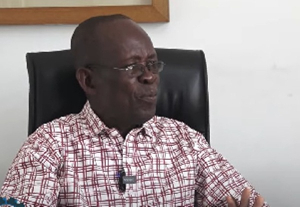 Abraham Koomson is the Executive Secretary of the Ghana Federation of Labour
Abraham Koomson is the Executive Secretary of the Ghana Federation of Labour
The Ghana Federation of Labour (GFL) has lauded the government’s decision to introduce tax stamps on palm and edible oils, textiles, beverages, and other products.
The move was described as a bold step to curb smuggling and protect local industries.
In a press release shared with GhanaWeb Business, GFL Secretary General Abraham Koomson noted that smuggling has long distorted fair competition, reduced government revenue, and weakened job security for Ghanaian workers.
He added that the new tax stamp regime, if well-designed and digitally verifiable, would safeguard domestic manufacturers, ensure product quality, and create a level playing field for businesses without imposing excessive compliance costs on small and medium enterprises.
Government to introduce tax stamp regime for refined edible oils – Ato Forson
“Smuggling has undermined local industries for years. A transparent and verifiable tax stamp system, combined with tighter border controls, can restore fairness, protect jobs, and strengthen government revenue,” Koomson said.
He further commended the government’s broader tax reforms, including the reduction of the Value Added Tax (VAT) rate, scrapping of the COVID-19 levy, and the extension of zero-VAT support for key industries such as textiles. According to him, these measures will ease the cost of doing business and boost competitiveness.
Koomson’s comments follow the Minister of Finance, Dr Cassiel Ato Forson, revealing during the 2026 budget presentation that the government will roll out a tax stamp regime for refined edible oils.
The initiative is expected to enhance tax compliance, eliminate under-declaration of goods, which costs the country millions of cedis annually, and protect domestic producers.
Dr Forson explained that the reforms will not only help Ghana achieve self-sufficiency but also build an export-ready downstream crude palm oil sector that adds value and creates jobs.
Under the framework, the Tree Crops Development Authority (TCDA) will serve as lead regulator, overseeing licensing, production planning, and data management.
The Oil Palm Research Institute (OPRI) will develop high-yield, climate-resilient palm varieties, while the Oil Palm Development Association of Ghana (OPDAG) will drive industry coordination and public-private dialogue.
Government estimates that the policy could reduce imports of over $200 million worth of oil annually and create about 250,000 jobs, providing a major boost to Ghana’s industrialisation agenda.
SA/MA
All you need to know about Ghana’s new vehicle number plates | BizTech:
